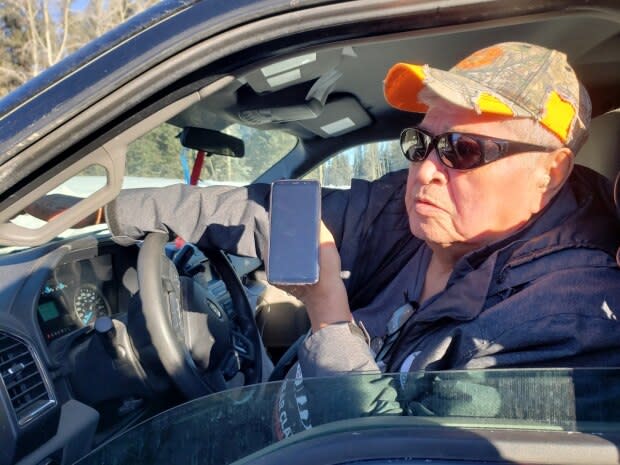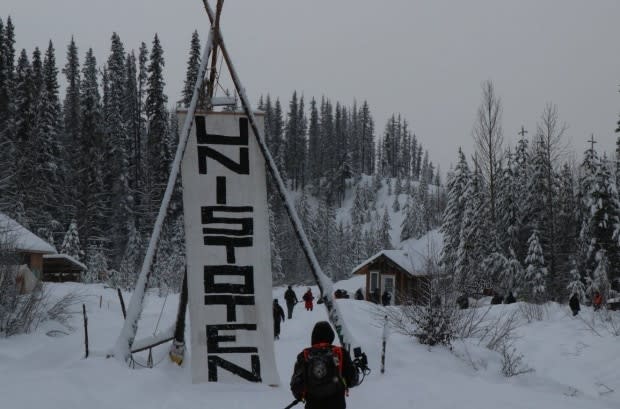Day 4: RCMP continue enforcement against Wet'suwet'en over pipeline injunction
It is day four of the RCMP's enforcement of an injunction order in northern B.C. to ensure that Coastal GasLink and its contractors can resume work in a disputed area of the pipeline route in the traditional territory of the Wet'suwet'en nation.
Since Thursday, the RCMP have been moving in, kilometre-by-kilometre, camp-by-camp, down the Morice West Forest Service Road, to enforce the injunction against named Wet'suwet'en defendants and supporters.
The forest service road begins at a turn off from Highway 16 in Houston, B.C. It twists and curves, forking off in different directions and is a roadway Coastal GasLink is depending on for construction work on a $6-billion, 670-kilometre natural gas pipeline that has received approval from the province.
On Dec. 31, a B.C. Supreme Court judge issued an injunction against members of the Wet'suwet'en Nation blocking access to the pipeline project inside their traditional territory and empowered RCMP to enforce the injunction.
First Nations and other organizers have been rallying in support of the hereditary chiefs across Canada — holding solidarity protests, putting up roadblocks and blocking railways across the country while others grow increasingly frustrated with the people defying the injunction order and want to see the pipeline go ahead.
On Sunday, police continued to maintain an exclusion zone checkpoint at the four-kilometre mark on the forest service road near Houston — not allowing anyone except police and contractors to go through.
CBC was allowed to cross the checkpoint with an escort but was prevented from going any further than the 44-kilometre mark on the road, where the Gidimt'en checkpoint has now been dismantled.
Wet'suwet'en hereditary chiefs and supporters have started gathering at the four-kilometre mark at the edge of the exclusion zone, waiting anxiously for news of what's happening further down the road.
"You know, I never ever thought that we as We'tsuwe'ten people would ever be faced with such a crisis as we're facing today," said hereditary chief Kaliset.
"Us elders, we've sat back and we've watched — we support our young people with the work that they're doing. Today we're speaking out."
While many have been showing up to stand in support of the hereditary chiefs — in the territory and around B.C. — there are others waiting to get back to work in the area.
"We are extremely proud of the broad support we have across northern B.C., and that all 20 elected Indigenous communities have signed agreements with Coastal GasLink," said Coastal Gaslink President David Pfeiffer in an open letter earlier this week.
Among those 20 agreements are five band councils in the Wet'suwet'en nation.
However, the Wet'suwet'en hereditary chiefs say those band councils are only responsible for the territory within their individual reserves because their authority comes only from the Indian Act.
The hereditary chiefs — who are the leaders of the nation's governance system in place before the imposition of the Indian Act — assert authority over 22,000 square kilometres of the nation's traditional territory, an area recognized as unceded by the Supreme Court of Canada in a 1997 decision.
More than 20 people arrested since Thursday
By Saturday night, police had arrested a total of 21 people. Eleven of those people were arrested on Saturday at a site referred to as the warming centre, after police announced it had become part of an expanded exclusion zone.
Police told the people at that warming centre on Friday night they have to leave the site by Saturday morning or face arrest for breaching the injunction. The Wet'suwet'en hereditary chiefs objected to people being removed from the area and the relationship between chiefs and the police was visibly strained on Saturday.
"We've been fed a bunch of lies ever since we met you guys," hereditary chief Madeek told RCMP Chief Superintendent Dave Attfield in a heated phone conversation on Saturday when the chiefs were being kept out of their territory at a checkpoint marking a expanded exclusion zone.

RCMP say the exclusion zone was expanded on Saturday based on the actions of people at the warming centre in recent days "that could possibly endanger those who travel the road, and a blockade of parked vehicles."
CBC has asked the RCMP for clarification about what precisely an "exclusion zone" is and has yet to receive a response.
Unist'ot'en next reoccupation site facing enforcement
Much of Saturday's police activity involved police removing people from the warming centre area.
As the injunction enforcement continues for the fourth day, there remains one main site where police have yet to take action — the Unist'ot'en healing village.
It's not clear how many people are staying there or what kind of obstacles stand in the way of Coastal GasLink and its contractors.
Police said in a news release that members of the Indigenous Police Division and Division Liaison team approached Unist'ot'en "to facilitate conversation" on Saturday but said "the occupants of the Healing Centre declined to engage.

Social media posts and news reports from journalists embedded at the centre reported the police arrived by helicopter on Saturday and that people at Unist'ot'en did not engage in conversation with the police because they were holding a ceremony.
There was little activity reported from the area by mid-afternoon on Sunday.
CBC is unaware of what kind of enforcement actions might take place at Unist'ot'en, and when, but will be watching for developments throughout the day.


